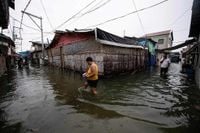On September 13, 2025, the Philippines found itself at the center of a political storm, as a sweeping corruption scandal involving flood control projects rattled government institutions, tested the resolve of the military, and prompted an urgent response from President Ferdinand Marcos Jr. The unfolding events have spotlighted the stakes for a nation long plagued by natural disasters and deep-rooted corruption, with billions of pesos allegedly siphoned from projects meant to protect its most vulnerable communities.
According to The Associated Press, the controversy erupted after allegations surfaced that dozens of lawmakers, senators, construction companies, and public works engineers had pocketed massive kickbacks from government-funded flood control projects. These projects, some substandard and others entirely non-existent, were meant to safeguard lives and property in a country regularly battered by deadly typhoons and devastating floods. The Department of Finance has estimated that the Philippine economy lost up to 118.5 billion pesos (around S$2.66 billion) from 2023 to 2025 due to corruption in these projects, as reported by The Straits Times.
The public’s response was swift and intense, though largely peaceful. While recent weeks saw violent protests in countries like Nepal and Indonesia, street rallies in the Philippines remained smaller and nonviolent. Outrage instead poured out online, with Catholic church leaders, business executives, and retired generals voicing their frustration on social media platforms. During one notable rally, a speaker urged the military to withdraw support from President Marcos Jr., calling for a non-violent "people power" revolt reminiscent of the uprisings that ousted Ferdinand Marcos Sr. in 1986 and Joseph Estrada in 2001.
In the face of these calls, Philippine defense and military leaders moved quickly to reaffirm their loyalty to the constitution and the civilian government. Defense Secretary Gilberto Teodoro Jr. and military chief of staff General Romeo Brawner Jr. issued a joint statement late Friday, stating, "We reject all attempts to patronize the Armed Forces of the Philippines by certain groups that insinuate or suggest unconstitutional, unilateral interventions." They underscored the military’s non-partisan, professional stance, emphasizing that the 160,000-member armed forces "abide by the constitution through the chain-of-command." Teodoro and Brawner further warned, "At this critical juncture for our national security in the face of threats to our peace and regional stability, politically motivated attempts to distract the Armed Forces of the Philippines from focusing on its mission are not only futile but also irresponsible."
Two high-ranking national security and defense officials, speaking to The Associated Press on condition of anonymity, confirmed there was no credible threat of secessionism within the military or police. This assurance provided some relief to a public wary of the country’s history of military-backed uprisings.
President Ferdinand Marcos Jr., for his part, has publicly supported anti-corruption efforts and has taken concrete steps to address the scandal. On September 13, he announced the appointment of two members and a special adviser to a newly formed Independent Commission for Infrastructure (ICI), tasked with investigating the anomalous flood control projects. As reported by GMA Integrated News, the appointees were described by Malacañang as "of proven competence, integrity, and deep familiarity with infrastructure, finance and institutional reform."
The commission members include Rogelio "Babes" Singson, a former Secretary of the Department of Public Works and Highways (DPWH) known for leading anti-corruption programs and major infrastructure initiatives, and Rossana Fajardo, the Country Managing Partner at SGV and EY ASEAN Business Consulting Leader. Benjamin Magalong, the sitting Baguio City Mayor and a former Deputy Director General of the Philippine National Police, was named special adviser and investigator. Magalong’s long career in law enforcement, including his leadership in high-profile investigations such as the Mamasapano incident, has earned him a reputation for independence and rigor.
Presidential press officer Claire Castro emphasized the impartiality of the commission, stating, "None of them are connected to any agency or contractor that is under investigation." She added, "As the president said multiple times, there will be no sacred cows here – even relatives, friends and allies." Further, Ms. Castro noted that President Marcos Jr. would appoint a commission chairman in the coming days.
The commission, created by executive order on September 11, 2025, is empowered to "conduct hearings, take testimony, and receive, gather, review, and evaluate evidence, reports, and information." It can also request the freezing or seizure of funds and property linked to fraudulent flood control and infrastructure projects, though it lacks the authority to prosecute or take action independently. Its mandate covers infrastructure projects launched in the past decade, reflecting the depth and breadth of the alleged wrongdoing.
The stakes are high. Last week, construction firm owners and a former DPWH engineer implicated at least 28 lawmakers and government officials in the scandal, alleging that they routinely demanded cuts ranging from 10 to 25 percent of earmarked funds. The fallout has already reached the highest echelons of government: on September 8, former Philippine Senate president Francis Escudero was replaced by Vicente Sotto III amid ongoing investigations, after Escudero’s name was linked to one of the country’s top flood control contractors—a charge he dismissed as a "demolition job" aimed at removing him from the Senate’s top post.
The scandal has struck a nerve in a country where public trust in government is often fragile and the cost of corruption is measured not just in pesos, but in lost lives and livelihoods. The Philippines is one of the world’s most disaster-prone nations, and every peso stolen from flood control projects is a blow to communities that depend on functioning infrastructure to survive typhoons and rising waters. As ABS-CBN noted, the country’s leading media and entertainment company, issues of public service and accountability remain front and center for Filipinos, who expect more from those in power.
Despite the gravity of the allegations, the response from officialdom has so far emphasized due process and institutional reform over dramatic gestures. "The strength of our republic rests on the rule of law and the unity of our people," Teodoro and Brawner declared in their joint statement. "At this crucial time, we call on every Filipino to place their trust in our democratic institutions, to respect our processes."
Whether the new commission can deliver the accountability and reform that many Filipinos crave remains to be seen. Its independence, powers, and the integrity of its members will be tested as it begins its work. For now, the country watches and waits, hoping that the lessons of the past—when scandals were swept under the rug or used as weapons in partisan battles—will not be repeated.
With the eyes of the nation and the world upon them, Philippine leaders face a defining test of their commitment to transparency, justice, and the rule of law.


